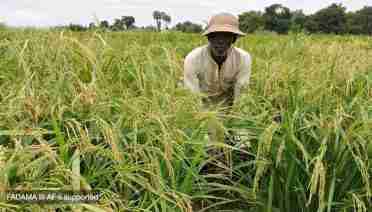The Fadama National Project stands as one of the World Bank-funded programs in Nigeria. Founded in 1993, the program derives its name from the Hausa word for “irrigable land.”
The project has the aim to help locals with cash for their farms. Over the years, it has become popular with many Nigerian farmers, thereby witnessing many years of operation. As of today, the program enters its third phase (FADAMA III).
Moreover, the project has helped local farmers grow their backyard farms into large-sized establishments.
Presently, the FADAMA program has offered funds worth $200 million for rice farming. But growers of cassava and sorghum can have access to loans form this sum. With this cash, the program will enhance food production in locations such as Anambra, Enugu, Kano, Kogi, and Lagos.
Farmers use FADAMA loans to grow more food than expected. They can also supply these crops with improved features. Since farmers enjoyed working under previous FADAMA schemes, the third phase promises similar working conditions.
Features of the FADAMA Project
As mentioned earlier, FADAMA places its interests in 6 six states and their neighbouring areas. Under the program, these places identify as catchment areas. Moreover, the current phase of the scheme has a relationship with the Agricultural Transformation Agenda program of the Nigerian Government.
Apart from increasing the crop of various applicants, the funds improve their earnings and provide them with water for farming. The program also assists farmers in selling their products since they practice commercialized farming.
FADAMA has a structure that groups participants into clusters. These clusters occur in all states currently under the scheme. Possibly due to this organization and other features, the project has caught the attention of giant corporations such as Cargill and Dangote.
Related:
- 10 Profitable Businesses in Nigeria with Low Capital
- Forbes 30 Under 30 Requirements – How to make rich list
- The Ultimate Guide on How to Become a Yahoo Boy in Nigeria
In summary, the FADAMA III program aims to provide a stable source of income for all participants. To partake in this program, an individual will have to be a fisher, farmer, herder, or hunter. Providers if Agric services can also join the scheme.
Find below some positive aspects of the FADAMA III project.
- Local farmers can access FADAMA loans through the Nigerian Agricultural Co-operative and Rural Development Bank.
- It helps private firms again interest in the Agric sector of the economy. In the end, the private sector can provide services that can benefit the scheme’s participants.
- It ensures the development of rustic communities. After all, the program offers participants the means to support schools, healthcare centres, and other infrastructure in these locations.
- The project allows users to choose between private or public service providers. This freedom helps the farmers take part in other sections of the business.
- Participants can access short and long term loans.
- The scheme plans to employ thousands of youths. Nicknamed as GUYSS (Graduate Unemployment Support Scheme), you will find the participants in all FADAMA catchment areas.
- The project intends to benefit millions of households across the country.
Requirements to Join the FADAMA Scheme
Are you interested in joining the FADAMA III program? If yes, you must fall within a specified age bracket and a group of individuals. These groups include farmers of staple foods and horticultural plants; people that process these crops and new applicants under the GUYSS scheme.
After meeting these requirements, head to the FADAMA offices in the catchment areas for additional information. They will also give better details about the age limit of prospective applicants.
Final Words
Since farming communities cannot supply Nigeria with adequate food, FADAMA came as a suitable option to meet the nation’s food requirements.
With this program, farmers will enjoy higher yields of cassava, rice, and sorghum. They will also have higher earnings from their produce.
You’ve learnt a lot from this article, do not forget to share with your friends and family on Facebook, Twitter and WhatsApp. You can also follow us on Facebook and Twitter.

Leave a Reply
You must be logged in to post a comment.